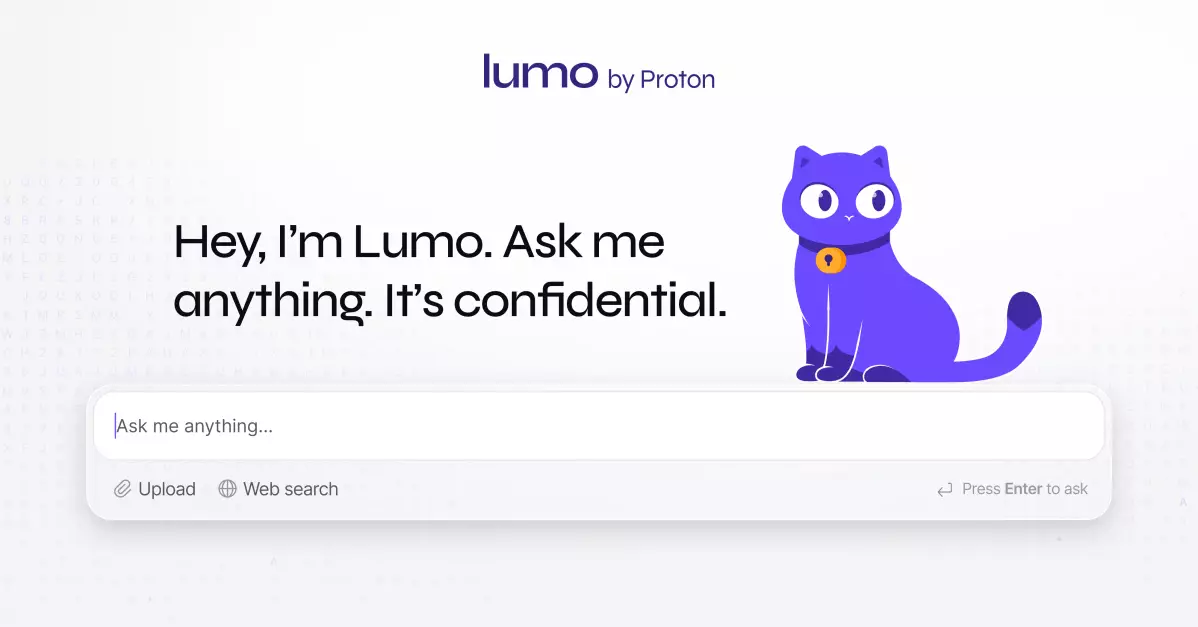In an era dominated by digital surveillance and the relentless pursuit of user data, Proton’s latest innovation, Lumo, emerges as a beacon of hope for privacy-conscious individuals. Unlike conventional AI assistants offered by tech giants, Lumo champions a paradigm shift: placing user sovereignty above corporate profits. This emphasis on zero-access encryption signifies a bold move towards fostering genuine trust between users and technology. It challenges the pervasive narrative that AI must compromise privacy for utility, asserting instead that robust privacy can coexist with sophisticated artificial intelligence.
The core philosophy behind Lumo’s development reflects a rebellious stance against the exploitative data harvesting practices that have become commonplace. As large corporations commodify user interactions—collecting, analyzing, and monetizing every keystroke—Proton positions itself as an advocate for user rights. Their claim that neither Proton nor third-party entities can access user data thanks to zero-access encryption isn’t just a technical feature; it’s a statement of ideological resistance against surveillance capitalism. This approach imbues Lumo with a sense of integrity that many users yearn for but seldom find in mainstream AI offerings.
Technological Innovation Anchored in Ethical Principles
At the heart of Lumo’s technological architecture lies a meticulous combination of open-source large language models and advanced encryption methods. Proton’s decision to run models like Mistral’s Nemo, Nvidia’s OpenHands, and AI from the Allen Institute showcases a commitment to transparency and diversity in AI development. This multi-model system ensures that Lumo can handle a broad spectrum of tasks—be it coding, document summarization, or content generation—while maintaining strict privacy standards.
What truly distinguishes Lumo is its local data storage strategy. By ensuring that user inputs, files, and chat histories are stored exclusively on the user’s device and protected with zero-access encryption, Proton effectively eliminates the primary vulnerabilities associated with cloud-based AI systems. Users retain sole possession of their encryption keys, rendering any unauthorized access virtually impossible. This technical framework explicitly counters the usual narrative surrounding AI—where user data often becomes a commodity—by making privacy the default and default the default.
The optional web search feature further exemplifies Proton’s focus on privacy. Users are given control, deciding whether to enable searches via privacy-respecting engines. Even then, the design ensures that data exchanges remain limited and secure. Such selective transparency balances utility with privacy, recognizing that users value functionality but not at any cost.
Progressive Pricing and Accessibility
Proton’s approach to accessibility underscores its commitment to democratizing privacy-preserving AI. The tiered model—featuring limited free use alongside a premium subscription—strikes a balance between sustainability and user empowerment. The free tier offers essential functionalities without compromising privacy, while the $12.99/month Lumo Plus plan unlocks unlimited interactions, larger uploads, and extended chat histories. This structure encourages widespread adoption without incentivizing intrusive data collection.
In a landscape where privacy is often an afterthought or a luxury, Proton’s transparent policies and commitment to open-source AI models shine as a testament to ethical progress. It’s an acknowledgment that privacy isn’t a privilege but a fundamental human right, even in a digital age increasingly dominated by intelligent machines. Lumo exists not merely as an AI assistant but as a philosophical pivot: proving that privacy and advanced AI can coexist, challenging the notion that mass surveillance is the price of technological advancement.
The Future of Privacy-Centric AI: A Bold New Horizon
Lumo’s emergence marks more than a product launch; it signals a movement towards redefining standards in AI development. In a world where data is often weaponized, Proton’s stance inspires a reevaluation of what responsible AI can look like. By leveraging open-source models and ensuring user control at every step, Lumo not only protects individual privacy but also sets a precedent for other companies to follow.
This initiative sparks a crucial conversation: can privacy-centered AI be scalable, user-friendly, and commercially viable? Proton’s model suggests yes. Its focus on local data storage, selective web searching, and flexible pricing demonstrates that privacy does not have to be sacrificed for convenience or sophistication. Instead, it can be woven into the very fabric of AI design, leading to a future where users are active custodians of their digital lives rather than passive commodities.
As AI continues to evolve, Lumo’s principled approach challenges industry norms, highlighting that safeguarding personal data is not only possible but essential. Proton’s commitment to zero-access encryption and transparent practices underscores a vital truth: the future of technology should revolve around empowering users, not exploiting them. Only then can true trust be achieved—transforming AI from a tool of surveillance into a partner that respects individual autonomy.

